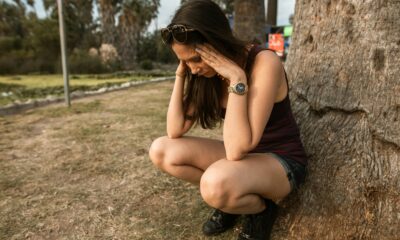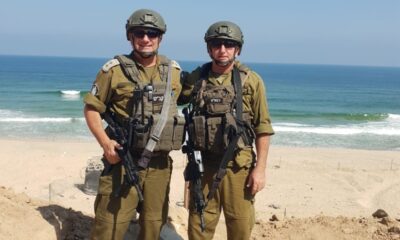
Israel

Unity – best defence against terrorism, says freed hostage
When one of her Hamas captors told Sapir Cohen that when Jews are together, they are very strong, she was shocked, but came to the realisation that the main goal of this war is to unite Jewry.
The terrorist’s surprising words came one day, when he allowed Cohen to watch television and they saw thousands of people at Tel Aviv’s Hostages Square. “I saw all our people together, and I was so happy because before 7 October, I remembered division,” Cohen told a Johannesburg audience last week.
Brought to South Africa by the Jewish National Fund South Africa and The Base Shul, Cohen, 30, spoke at a community event held in her honour at the shul on 15 May. Having travelled to multiple countries since her release, Cohen aims to promote unity and the release of the hostages through her story.
Six months before her kidnapping, Cohen began to sense that something bad would happen to her. Thinking she was ill, Cohen underwent medical tests but all they unearthed was a harmless virus.
“For the first time in my life, I decided to pray,” she said. Looking for a prayer for recovery, she came across chapter 27 of Tehillim on Instagram. It was written that saying this prayer for 30 days would make one healthy and bring about miracles.
“The 30th day of saying it was 7 October,” Cohen said. Only a few days prior to that, she felt confused when she realised that the prayer was linked to war, and asks G-d to save us from our enemies. Even the word “Hamas” appears in it. “On 7 October, I understood the meaning of my prayer,” she said.
On the weekend of Simchat Torah, Cohen and her boyfriend, Sasha Trufanov, visited his parents in kibbutz Nir Oz. In spite of Trufanov’s inexplicable misgivings before the trip, the couple went anyway. At 06:00 on 7 October, they awoke to a barrage of rockets.
“We were in the guest house with no bomb shelter, and we couldn’t find even 20 seconds of silence to run to his parents’ house to enter their shelter,” Cohen said. In messages from Trufanov’s mother, they heard that terrorists were in kibbutz Be’eri, just ten minutes away. They then read online that Hamas terrorists were slaughtering people with no army around to save them. When Trufanov received another message, Cohen instinctively knew that the terrorists were in Nir Oz. She covered herself with a blanket and the two hid under the bed.
“Then I heard, ‘Allahu Akbar!’ [G-d is great] and possibly hundreds of terrorists entered the kibbutz. I heard things explode. I heard the screams of the terrorists, and the screams of the people killed by these savages. It sounded like they were going home by home and shooting everywhere and everyone. You just had to wait your turn. I was terrified, I was shaking, my whole body turned to water.” Yet, through saying her prayer, Cohen felt a deep sense of peace that she battled to understand.
When the terrorists finally broke in, they yanked the couple out separately. “I saw Sasha with his knees on the floor, his hands over his head, and his face bleeding. They beat him,” Cohen said. “They put me on a bike with two terrorists, and that was the last time I saw him.”
To date, Trufanov remains a hostage, and Cohen is dedicated to securing his release. In an address to King David High School Linksfield students during her South African visit, Cohen asked them to shout, “Bring Sasha home now!” on video, something she plans to show him upon his prayed-for return.
“When I entered Gaza, I saw thousands of ‘innocent’ people in the streets,” Cohen said. “They were all encouraging the terrorists. They touched me, and beat me so badly that I put my hands over my head and prayed to G-d to save me.” As the goal in most hostage situations is to take captives alive, the terrorists ultimately saved her. During her 55 days of captivity, Cohen’s time was divided between tunnels and houses in difficult conditions. She described the tunnels as dark, narrow, wet, lice and flea-infested, and so smelly that you couldn’t sleep.
“Yet, I felt a lot of miracles, the biggest of which was that I was supposed to be there,” she said. “From the first day onwards, I was with another hostage, a 16-year-old girl. When I saw her, she was terrified and crying, and I said to G-d, ‘I don’t need more to understand that I need to be in this place.’ I wanted to make her happy, and to save her. From the moment I decided to take on this responsibility, I felt strong.”
She helped the girl, who was ultimately released, to find humour in the most trying of circumstances. Cohen’s attitude even mystified the terrorists, one of whom drew a memorial candle with her name on it. When she asked him why, he said that although she was their enemy and they hated her, while she was there, she filled the place with light.
Cohen spoke of her joy at being among the last hostages released in the temporary November ceasefire. Yet it was undercut by the sadness that came with knowing that there would be no peace. “One terrorist told me, ‘When you come back to Israel, we want you to give one message to your people: we’ll come back again and again, and the next time, it will be even worse’.”
Nonetheless, she remains dedicated to spreading light and unity in Israel and in Jewish communities around the world. “It’s important that the Jewish community [in South Africa] hears our stories firsthand, and knows that its prayer and fight for the hostages is working. When I came back to Israel and saw how many people had prayed for me, I understood that all the angels I felt in captivity weren’t imaginary.”










